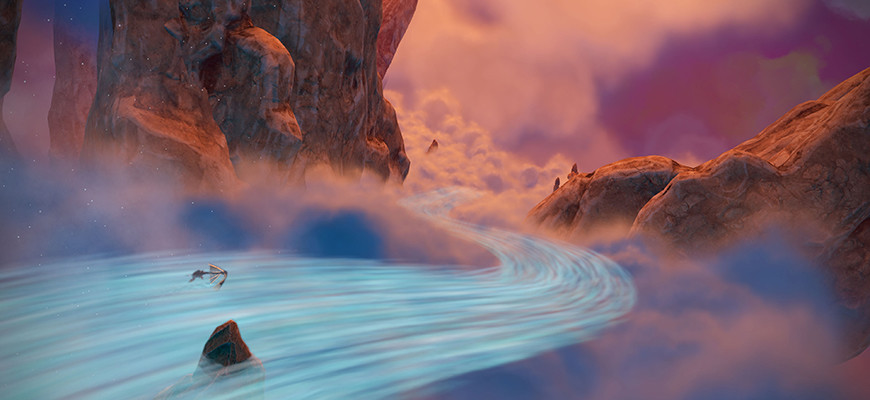
Raising the game
Posted on Jun 14, 2020 by Matthew Gooding
Cambridge’s video games community is one of the most prolific of its kind in the UK, with big studios and indie creators churning out a wide range of titles. Matthew Gooding finds out what makes this growing cluster tick
Words Matthew Gooding
The games industry is booming, and it’s no surprise Cambridge ideas and talent are at the heart of one of the UK’s most vibrant business sectors. Figures released earlier this year by Ukie, the trade body sector, showed that games development and associated activity generate £2.87bn gross value added (GVA) each year, providing over 47,000 full-time jobs. Despite this, gaming is rarely more than a footnote when it comes to discussing the strengths of the UK economy, with the sector hindered by outdated, negative perceptions.
But the times, they are a-changin’. “People always parallel games to cinema – and there are similarities,” says Jon Ingold, narrative director at Cambridge studio, Inkle. “Early cinema was all about people getting hit by trains, and then the later stuff becomes more about emotion and discussion and tension and character drama. Gaming is on a similar path, it’s just about finding space for that and getting the audience to trust you enough to be able to do things.”
According to Ukie’s data, Inkle is one of 47 active games companies in Cambridge, between them employing over 850 people and generating £28.7m GVA a year. The studio has made a name for itself with narrative driven titles such as the Bafta-nominated 80 Days and Heaven’s Vault, an archaeology themed titled that came out last year to co-founder Joe Humphrey started the company in 2011 when the pair were working at Sony’s now defunct Guerrilla Cambridge studio.

“The reason the company exists is to discover how good storytelling in games can be,” he says. “I did a maths degree, but I always wanted to be a writer. No one would let me write novels, so I found my way into games as a compromise between doing something creative and something technical.
“For me, the aim is always to make games with real humans in them, because very few games manage that. It’s an interesting challenge technically and artistically, and when you get it right, it’s really special. Sometimes, even when games have good characters, the mechanics end up being a bit clunky and unrewarding. So you have to get through a gun fight or a challenge to have another character moment.
 The difficulty is that you always have to give the players something to do, so what are the different things you can make the player do?
The difficulty is that you always have to give the players something to do, so what are the different things you can make the player do?
“The difficulty is that you always have to give the player something to do, so what are the different things you can make the player do? That’s often the starting point for us; if the player isn’t just walking around shooting everything in sight, then what can we make them do instead?”
Rather than raiding tombs and running away from monsters, players in Heaven’s Vault spend time on more cerebral pursuits, uncovering artefacts and deciphering inscriptions. Like a real archaeologist, rather than a bad Indiana Jones clone.
“People tend to initially think it’s quite slow, but it builds and builds, and when you start to understand the culture, people really get into it,” Jon explains. “That was a real design challenge, making it compulsive without the combat element that is bread and butter for a lot of games. Starting Inkle has been completely life-changing and it has meant I’ve been able to do the things I love every day with some degree of success, which is very humbling.”
While Inkle is typical of many of the small studios in Cambridge, with a core team of four and a larger group of 11 staff who work on specific projects, the city is also home to several bigger firms working on blockbuster titles. Though Guerrilla bit the dust in 2017, Frontier Developments has been on a roll in recent years, following the success of Elite Dangerous, a follow-up to the classic 1980s space trading game Elite, which has gone from strength to strength since its release in 2014.

Buoyed by this success, and that of follow-up releases such as Planet Coaster and Jurassic World Evolution, the company, founded by video games legend David Braben, now occupies swanky, purpose-built headquarters at Cambridge Science Park.
Also soon to be in new premises is Ninja Theory, which is building a new base on Newmarket Road, complete with a gaming pub on the ground floor. It was acquired by Microsoft in 2018, but operates autonomously and delivers ground-breaking content such as Hellblade: Senua’s Sacrifice, a game that won widespread acclaim for its portrayal of psychosis. A follow-up is in the works, while the studio has also launched Project Insight, a collaboration with the University of Cambridge combining game design, clinical neuroscience and cutting-edge technology to work on new methods of therapy for mental disorders.

Perhaps the best-known name in the Cambridge Cluster is Jagex, publisher of RuneScape, the world’s longest running massive multiplayer online game. Initially the brainchild of brothers Andrew, Paul and Ian Gower, RuneScape will celebrate its 20th birthday in 2021 and is, apparently, more popular than ever, having welcomed a record number of players to its game worlds in 2019.
“Community has always been at the heart of RuneScape,” says Jagex’s Rich Eddy of the game’s enduring popularity. “Players interact with each other, build relationships outside the game and have been on the journey with us over the last 20 years.”
Indeed, players are now directly influencing the way Old School RuneScape (the company’s retro title) expands, with all new developments being put to a player vote before they are implemented in the game. As you can imagine, RuneScape isn’t going anywhere, but Rich says Jagex is also looking to expand its horizons to ensure it continues to thrive in a changing industry.

 We have years of experience of running the back-end stuff and maintaining a live game. With the rise of different publishing services, I think more firms like ours will look to partner with smaller studios to help take their titles to market.
We have years of experience of running the back-end stuff and maintaining a live game. With the rise of different publishing services, I think more firms like ours will look to partner with smaller studios to help take their titles to market.
“Most of our team work on RuneScape and Old School RuneScape,” he says. “But we’re looking to expand our portfolio and have a new game in the early stages of development and production. We’re also talking to other studios about how we can help them bring their games to life. We have years of experience of running the back-end stuff, maintaining a live game and keeping players safe and happy, which we think can benefit other companies. With the rise of different publishing services, I think more firms like ours will look to partner with smaller studios to help take their titles to market.”

One small studio at the start of its journey is MiniBeast, which released its first product, multiplayer racing game Must Dash Amigos, last year. Anthony Brunton-Douglas, who co-founded the company with friend Ben Lowther, says: “We wanted to make a fun game that we’d enjoy playing. Mario Kart was a big influence, and we decided on the theme because we were drinking Mexican beer at the time!”
He adds: “We’d been working on the game in our spare time, and only really started to take it seriously after we showed it at the Norwich Games Festival and got a really positive response.”

After a successful launch on Steam and Xbox One, Must Dash Amigos has now made its way to the Nintendo Switch. “It’s the first game we’ve designed from scratch, so to see
people streaming it and having a good time playing it is amazing,” Anthony says. “We’re working on a prototype for a new game now, which we want to pitch to investors, so we’re going to take our time and get it right.”
So what makes Cambridge such a gaming hotspot? For Rich, being part of the wider tech cluster is key. “The university is the starting point for everything, because it attracts great people to the area,” he says.
“You’ve got access to an ecosystem of tech people such as data scientists, who might not be from a gaming background, but who enjoy playing games and can bring a different perspective. The level of expertise in the city is breath-taking.”
 The thing that makes being independent worthwhile is you can try things bigger studios can’t do, because they can’t afford to take risks
The thing that makes being independent worthwhile is you can try things bigger studios can’t do, because they can’t afford to take risks
Anthony says the supportive developer community has helped MiniBeast grow. “The Cambridge Game Devs monthly meet-up is really useful,” he says. “You can chat with other people in the same boat as you, ask questions and share the problems you’re having. The indie scene in Cambridge and the wider region with places like Norwich, where I studied, is really great.”
Jon adds: “There’s a strong developer community, which means there’s always a great pool of people around. So when we needed artists for Heaven’s Vault, we knew who we wanted, and then when the project finished, a lot of them were able to move on to jobs elsewhere. You get a nice community of talent, you know what people can do and where to find them.”
He and his team are now working on a new game, an as-yet untitled Arthurian epic that plays as a tactics-style boardgame, which is set for release later this year.
“Gaming is a very fast-moving environment and it’s an industry of bubbles,” Jon says. “At the end of 2011, when we started, we were at the end of a bubble and there were indie games creators generating vast quantities of money.

“There was a period there when it looked like the big players wouldn’t get back on their feet. But now actually the big developers and the triple-A titles are very strong indeed, and indies are struggling to survive in that market. But it’s likely to swing back again soon, and the thing that makes being independent worthwhile is that you can try things bigger studios can’t do, because they can’t afford to take the risks. That gives us a space, a natural niche to make things that can’t be made by anyone else.”
Fun at Cambridge gaming festivals

Underpinning the Cambridge games cluster are its student gaming festivals, which play a key role in inspiring the next generation of talent. Brains Eden has been attracting university students to Cambridge from around Europe for the last 12 years. Held at Anglia Ruskin University, the games jam sees teams working up new concepts and networking with some of the biggest names in the industry. For the younger generations, the FXP Festival offers an
introduction to the world of games development. Now in its fifth year, the festival takes place at Cambridge Regional College and is open to children in school years 8 to 11, as well as those in further education. It attracts teams from schools and colleges around the city and beyond.
“The objective is to get computer science students, as well as those on art and design courses, together for an exciting multidisciplinary challenge,” Joanna Colley, one of The organisers, told Cambridge Catalyst.
“We don’t just want it to be about technical skills, which is why we’re introducing new categories this year for best game concept and best physical game. The concept competition will see the students produce a storyboard, create characters and map out what the game world might look like, and the physical game design will centre around using craft materials to create a board game or card game.
“The main competition will remain the same, with the students working to create a game based on a surprise theme, which they find out on the day, with the aim of having a playable game by the end of the weekend. We hope the new categories will help open up the competition to more students and different demographics.” Joanna says the festival, which is backed by CRC, North Cambridge Academy and Jagex, is a useful way to open the students’ eyes to the opportunities available in the gaming sector. “The careers aspect is really important,” she says. “By using the world of gaming and technology, we can show the students how the things in the classroom can translate into interesting job opportunities.”
FXP 2020 is taking place from 4 to 6 July. The weekend is free for participating teams, but the organisers are always on the look-out for new partners.



